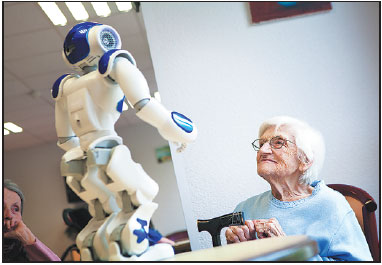The New Frontier for Artificial Intelligence: Senior Care


Source Image : The New Inquiry
The healthcare sector is facing many challenges such as shortage of beds and staff to meet the demands of rising healthcare standards and an aging population. While AI cannot solve all problems in health care, using AI powered medical tools is making it easier for doctors to cater to a larger number of patients. Artificial intelligence has made steady strides as a useful tool for healthcare professionals, and some estimate its market in the industry will exceed $5.5 billion by 2022. With every hospital having detailed data of patients with their diagnosis, the line of treatment, tests and treating doctors, it is easy for clinicians to provide targeted, lifesaving interventions, identify medical risks and make accurate and early diagnoses lead to timely treatments and, deliver precise medication leading to better outcomes.
According to the UN report, “Compared to 2017, the number of persons aged 60 or above is expected to more than double by 2050 and to more than triple by 2100, rising from 962 million globally in 2017 to 2.1 billion in 2050 and 3.1 billion in 2100.” The number of those aged above 65 in Singapore is set to double by 2030 to 900,000 which means one in 4 people will be elderly. To meet this demand, the number of nursing home beds has increased from 9,000 in 2011 to more than 12,000 in 2017 and almost 60 to 70 percent are run by voluntary welfare organizations.
The number of those aged above 65 in Singapore is set to double by 2030 to 900,000 which means one in 4 people will be elderly. To meet this demand, the number of nursing home beds has increased from 9,000 in 2011 to more than 12,000 in 2017 and almost 60 to 70 percent are run by voluntary welfare organizations.
Instead of aiming at building more care facilities for the growing elderly population with a shortage of skilled people, healthcare providers are turning to technology to meet this challenge. In particular, Artificial Intelligence is going to be the game-changer and if deployed well, can make a huge difference in improving elderly care.
Discharged hospital patients going home to self-care, with only occasional follow-up medical appointments, may struggle to maintain their care plans. They may be confused about what to do or how to do it; they may feel better and hence decide to discontinue their medicines. They may even forget or lose motivation. This is particularly true for seniors living alone. When social isolation is added into the mix, and the increased likelihood of depression, keeping elderly people well at home can become a real challenge.
With most of the elderly people going through some form of medical issues, an AI chatbot companion at home can add value and provide “smarter care” at home in the following ways.
Remind them when to take medication with the proper dosage instructions
Contact their caregiver/children in case of emergencies
Encourage them to be active
Fix doctors’ appointments and remind them to attend.
Fear of falling and loneliness are major challenges that most seniors face. Bots need to be programmed to combat loneliness, anxiety, and confusion. The only challenge that AI-enabled robot needs to have the emotional intelligence to meet the emotional, social, cultural and physical needs of the elderly.
A companion robot developed at the University of Denver, for example, is designed to address the needs of patients suffering from dementia, Alzheimer’s and depression. The ELLI.Q, an “aging companion” from Intuition robotics uses machine learning, and computer vision to enable proactive suggestions, entertainment and activities in addition to wellness & environmental monitoring.
Many organizations like Google, Microsoft, Philips, in addition to startups like Winimy are working on voice-enabled robot companions to help improve customer satisfaction and use Voice based AI bots for smarter care.
Meanwhile, research by an interdisciplinary team at the University of Missouri’s Center for Eldercare and Rehabilitation Technology focuses on using sensors, pattern recognition and analytics to help seniors stay active and independent.
Using data from residents of TigerPlace, an old-age care facility run by robots, with independent apartments equipped with sensors and RN care coordination, the center has conducted multiple projects that use both supervised and unsupervised machine learning and analytics to predict falls, detect the onset of health problems (such as urinary tract infection, low blood sugar and depression) and assess physical function
AI today is designed to make purely logical decisions using predictive insights. Adding a blend of emotional, social, cultural and physical needs would go a long way in impacting elderly care in a positive way. In conclusion, the use of AI chatbots in elderly care is inevitable. Due to the nascent nature of this technology, Present-day strategy appears to be to focused on developing basic AI capabilities in home companion products till R&D develops this technology further. In the future, it is expected that AI integration for elderly care robotics will be seen in applications like improving quality of life and independence, monitoring health and wellness and personalized companions and treatment.
